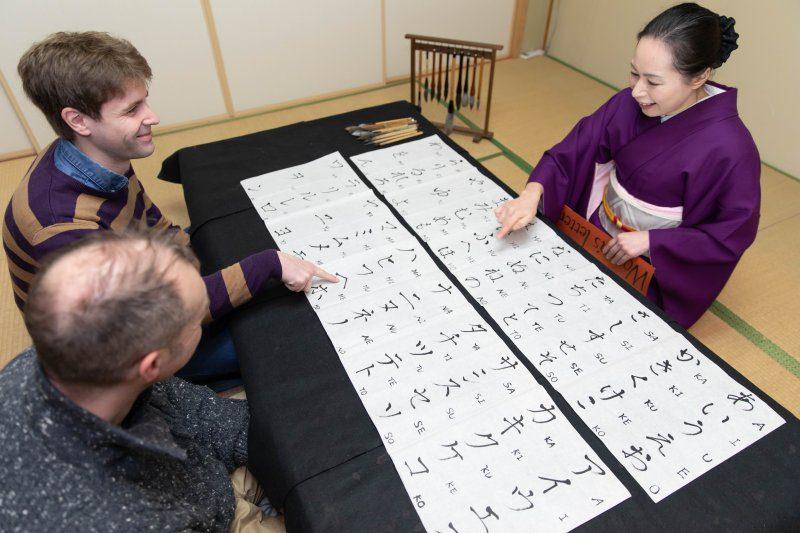If you are a beginner, one of the most important and easiest ways to get familiar with the Japanese language is to learn and practice the most frequently used phrases. In this article, we will learn the most useful phrases that will get you through different situations.
As a reminder, there are three different kinds of speech in Japanese. There is the informal, polite, and formal. In this blog, we will be introducing you to phrases in polite form so you can talk to everyone immediately.
The first thing you should learn as a beginner is to use the most common phrases, starting with the phrases for greeting someone.
Greetings

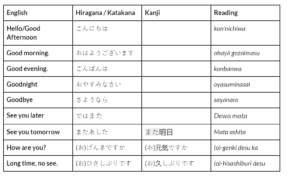
Introductions

When meeting someone for the first time, we should always introduce ourselves using polite language. Here are some essential Japanese phrases you can use when introducing yourself.
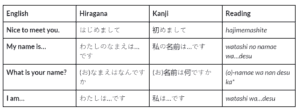
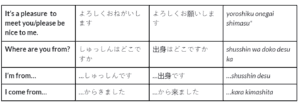
*よろしくお願いします (yoroshiku onegai shimasu) is a very common phrase that can mean different things depending on the context. This phrase is most often used when someone is entering a situation or environment that is new to them: meeting new people at work, starting a new job or project, greeting someone who will be taking care of them, etc. よろしくお願いします (yoroshiku onegai shimasu) is one of the most frequently used courtesy phrases in Japanese.
Introducing Yourself example:
- 初めまして、私の名前は清原美智子です。 よろしくお願いします。
Hajimemashite, watashi no namae wa Kiyohara Michiko desu.
“Nice to meet you. My name is Michiko Kiyohara.”Yoroshiku onegai shimasu.
- 出身はアメリカです。私は東京大学の留学生ですよろしくお願いします。
Shusshin wa Amerika desu. Watashi wa Tōkyō daigaku no ryūgakusei desu.
I’m from the US. I’m an international student at Tokyo University
Courtesy Phrases & Social Expression
The next common expressions you should know in Japanese, are going to consist of expressions you can use to show respect in different social and work situations. These expressions are going to be in the polite form known as ていねいご (teineigo).
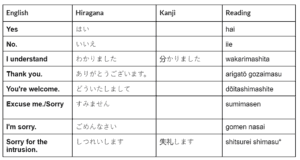
* 失礼します(shitsurei shimasu) This expression generally means “I’m sorry if I’m rude, but excuse me.” This expression is normally used when leaving an office or knocking on the door before entering someone’s room or office.
1. Dining Phrases

When ordering, it is suggested to use polite speech with the waiters and waitresses. Below are some basic Japanese phrases that you can learn and start using right away. I highly encourage you to try these phrases when you encounter a Japanese server at a Japanese restaurant.
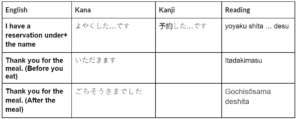
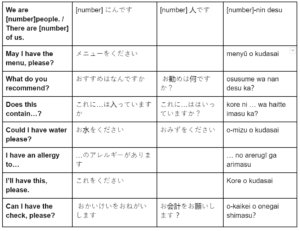
How to Order in Japanese:
- 4人です。 Yo-nin desu. “There are four of us.
- 卵のアレルギーがあります。これに卵は入っていますか。Tamago no arerugī ga arimasu. Kore ni tamago wa haitte imasu ka. “I am allergic to eggs. Does this contain eggs?”
- お勧めは何ですか。Osusume wa nan desu ka. “What do you recommend?”
- お会計をお願いします。O-kaikei o onegai shimasu. Check, please.”
Shopping

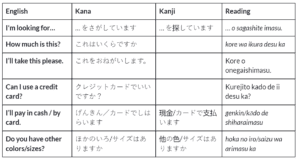

*Bonus tip*
Did you know when you get a PASMO or a SUICA card for transportation, like for local trains and busses, you could also use them at vending machines, taxis and even at a Seven-Eleven for necessities!
Communication

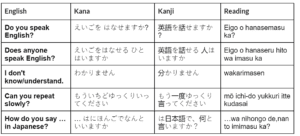
GREETINGS FOR WORK

If you are learning Japanese for work, the following phrases are used commonly in the workplace. Most of these phrases are also essential to use when working in a Japanese company.
As for the working culture, there will be times when you may have to work overtime. If you are going home before other people, please use these polite phrases.
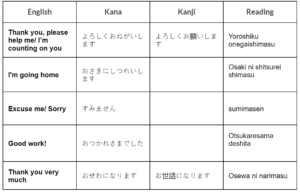
Now that you were able to learn some phrases I encourage you to try them out in real life! I know it will seem weird and scary at first but the more you use Japanese out loud you will gain the confidence that you will need!
Happy Learning!
Rosita Ruiz
